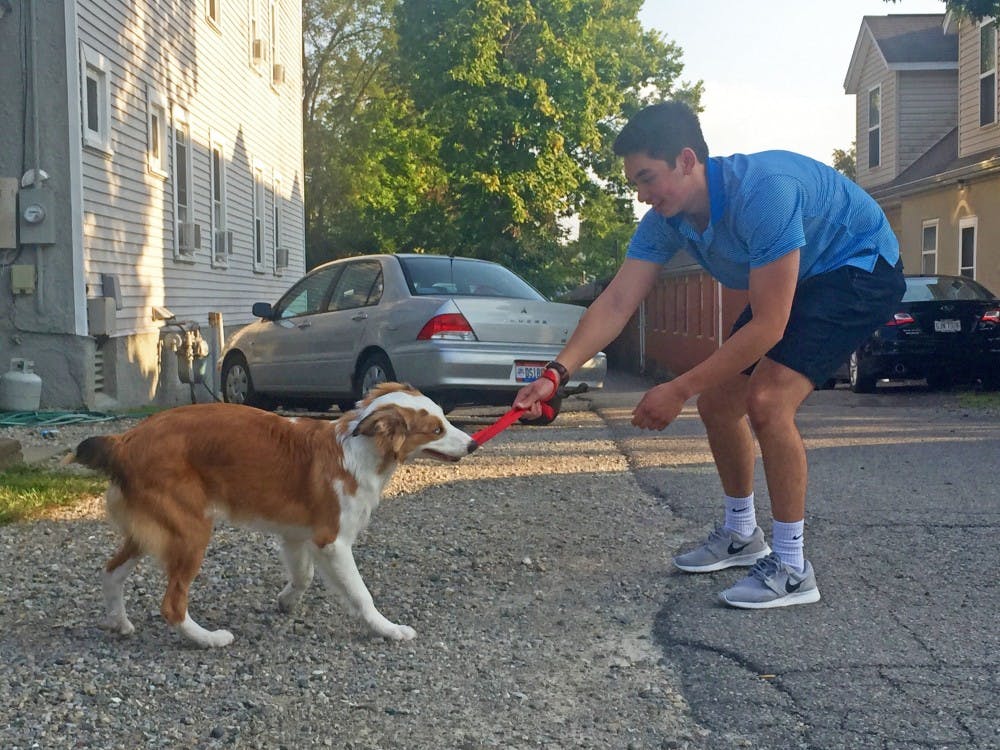By Riley Steiner, The Miami Student
At Miami University, some students have a different kind of roommate: one that has a wet nose, a wagging tail and is always happy to see you.
Miami does not allow pets in residence halls, but some students this year are sharing their dorm rooms with an Emotional Support Animal, or ESA.
An ESA is an animal that helps to alleviate or lessen symptoms for a student with a mental or psychiatric disability, like anxiety or depression, as determined by a doctor or other medical professional.
Miami's policy for admitting ESAs to residence halls states that the animals will be approved if "the student-owner clearly demonstrates the ESA is necessary to provide the student with an equal opportunity to use and enjoy the residence hall."
According to Director of Student Disability Services Andrew Zeisler, there are currently eight ESAs living in Miami's residence halls, including dogs, cats and a bearded dragon.
First-year Vivien Fierberg lives with her ESA, Cleo, to help with anxiety. Cleo is a bearded dragon - a medium-sized lizard whose throat puffs out when it feels threatened, giving it its "beard."
"I grew up on a farm, so I've always been around animals," Fierberg said. "When I decided to come here, it was important to me that I would be able to go back after school and still have an animal to hang out with."
For Cleo to be permitted in the residence hall, Fierberg had to follow the process laid out by Student Disability Services. A student who wants to register an ESA must provide written documentation from a healthcare professional, stating the student has a need for treatment of a mental or psychiatric disability and establishing the connection between that disability and the support the animal provides.
The student also has to provide a registration form and veterinary records for the animal. After that, the student signs a policy that states they will pay for any damages or pest infestations the animal causes.
This is a relatively new set of procedures; Miami's ESA policy has only been in place for three years. Before that point, the university had no formal procedure for admitting ESAs. Colleges across the country are adopting similar policies.
"When I was working through our [policy], I looked at different colleges around the nation, at their policies, and ours is consistent, obviously, with those," said Zeisler.
Enjoy what you're reading?
Signup for our newsletter
Service animals, like dogs for the visually impaired, are allowed anywhere on campus, according to the Americans with Disabilities Act (ADA). However, Emotional Support Animals are not currently recognized under the ADA.
"Under the Americans with Disabilities Act, a service animal is an animal that is trained to perform a duty," Zeisler said. "But under the Fair Housing Act, the ESA is an accommodation."
According to its policy, Miami provides accommodations to students who have a proven need for them.
There are no restrictions on the type of animal a student can have as an ESA, provided the animal can live humanely in the student's residence hall room. The student is responsible for cleaning and feeding the animal, and the ESA is expected to stay within the student's room.
The student can take the ESA outside in public places, but cannot bring it into dining halls or academic buildings, and the animal cannot be disruptive or pose a threat to other students in the residence hall.
"I always try to have the conversation with the student that residence hall rooms are not that big," Zeisler said. "So, humanely, in your opinion, what size of an animal do you feel is appropriate to have in that room? A St. Bernard or a Great Dane is probably not a good fit."
With an ESA like Cleo, no problems have arisen in the residence hall.
"I like it," said Fierberg's roommate, first-year Emily Martin. "It's kind of cool because I have a dog at home, so having a pet here is comforting. It's kind of like having an ESA for both of us."




